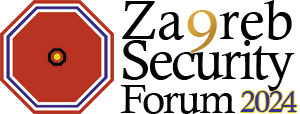
Non-fully-confirmed speakers and panelists for the 6
th Zagreb Security Forum, scheduled on September 3
rd-4
th, 2021.
At the 6th Zagreb Security Forum you will be able to listen, see and meet following experts that will offer their knowledge from the domains of various critical infrastructure protections (energy, water, and cyber).
Due
to the latest decision by Croatian national authorities, persons that
will attend conferences in closed areas does not need to wear a
medical/face-protection mask in a case that all of attendees has a VALID
EU DIGITAL COVID19 certificate. Therefore we are going to organize at
the entrance to the conference hall, together with other anti-pandemic
measures, system for EU DIGITAL COVID19 certificate checking.
https://ec.europa.eu/info/live-work-travel-eu/coronavirus-response/safe-covid-19-vaccines-europeans/eu-digital-covid-certificate_hr
https://ec.europa.eu/info/live-work-travel-eu/coronavirus-response/safe-covid-19-vaccines-europeans/eu-digital-covid-certificate_en
https://ec.europa.eu/info/live-work-travel-eu/coronavirus-response/safe-covid-19-vaccines-europeans/eu-digital-covid-certificate_de
Dr. Audinet, Maxime
Maxime Audinet has been a Research Fellow at the Institute for Strategic Research (IRSEM, Paris) since December 1, 2020. He holds a PhD in Political science and Slavonic studies from Paris Nanterre University and a master’s degree in political theory from the Doctoral School of Sciences Po Paris.
His research focuses on the influence of authoritarian states and analyses their actors, practices, and propagation. He is particularly interested in the informational operations conducted by post-Soviet Russia, in the continuation of his previous work on Russia’s public diplomacy (international broadcasting and cultural diplomacy) and interpretation of soft power (miagkaya sila). He has conducted several research studies on the field in Russia and Ukraine.
 Dr. Bouks, Barak
Dr. Bouks, Barak
Dr. Barak Bouks, Ph.D. (Bar-Ilan University, 2016), specializes in Religion & Terror. I won a scholarship, to attend and present a paper, at UCSIA's Summer school, The University of Antwerp, Belgium, Under the theme "Is Faith-based Violence Religious". In 2017, I served as committee member of the Jabotinsky Prize for Literature and Research. Throughout 2017-2018, I was elected as a peer reviewer for the journals Terrorism and Political Violence, Religion State and Society & Conflict Management and Peace Science. In 2020, I was nominated as an Editorial Team Member and the head of a consulting refereed regulation team, of the Scientific Journal "Security Science Journal", published by the Institute for National and International Security (Serbia) & The Europa Institute (Bar-Ilan University, Israel), The Research Institute for European and American Studies - RIEAS (Greece) and ITS – Institute for Transnational Studies (Germany). Main research interests are Terror & Religion, Middle-East & Security (Focusing in Lebanon), Arab Media (Focusing in Middle-Eastern regional media), conducting surveys, as well as qualitative & quantitative analysis (SPSS & Excel). In addition, Dr. Bouks serves as a commentator in the Israeli electronic media: Radio (Radio Eretz, Galei Tzahal) & T.V Channel I24 News.
 Dr. Charon, Paul
Dr. Charon, Paul
Paul Charon is Director for " Intelligence, Strategic Foresight and Hybrid Threats " at the Institute for Strategic Research (IRSEM). He holds a PhD in Political Studies from the School of Advanced Studies in the Social Sciences (EHESS) and an MBA (HEC). He has also been trained in Chinese language and civilisation (Paris Diderot University and Beijing Language and Culture University, BLCU), rhetoric (Harvard, Paris-Nanterre University), literature (Paris-Nanterre University) and law (Panthéon-Assas University). Prior to joining IRSEM, he worked for more than ten years as an intelligence analyst and then as a strategic foresight adviser for the French Ministry of Armed Forces. He was an associate researcher at the Franco-Chinese Antenna in Humanities and Social Sciences at Qinghua University in Beijing. His work focuses on China (intelligence services, information warfare), intelligence analysis, and anticipating strategic surprises techniques. He teaches at Sciences Po Paris, Sciences Po Saint-Germain-en-Laye, Panthéon-Assas University, the Institute for Higher National Defence Studies, and Rey Juan Carlos University in Madrid.
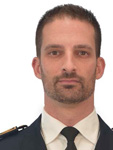 Diego, Jose L.
Diego, Jose L.
José L. Diego is an expert-evaluator for the European Commission within 3 different initiatives:
- Horizon2020 – Secure Societies challenge
- DG HOME Research Programmes
- Radicalisation Awareness Network
He began his career as a consultant at Deloitte, and nowadays is the Head of Project Management in the Valencia Local Police, as well as International Lecturer, OSCE Hate crimes trainer & Liaison officer and also Professor for a Master on Human Resources, for two Masters in Criminology and for the Chiefs´ Police Academy as well.
He has managed 30 EU projects (including 14 H2020-Secure Societies projects) in matters like R&D, domestic violence, police mediation and training, community policing, forensics, youth offending, crime fighting, road traffic, police management, diversity, emergencies, environmental police, cybercrime, Police ICTs, hybrid threats, smart cities & security, etc.
He holds Degrees in Law and in Criminology and a Master in Human Resources Management as well.
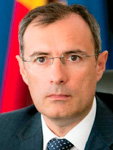 Lieutenant General (R) Coldea, Florian
Lieutenant General (R) Coldea, Florian
The longest running deputy director of the Romanian Intelligence Service, holding the office for twelve years with notable results, Florian Coldea ran all operations for Romania`s most significant domestic intelligence agency. After a total of twenty-one years in intelligence, the first spent in counter-terrorism, as an officer and manager, he has acquired significant tactical and strategic expertise in the fields of counter-intelligence, counter-terrorism, economical and trans-border crime. Was decorated by both the American partner, with the CIA Alben W. Barkley Medallion for partnership, and by the French one, with the Knight of the National Order of Merit, awarded by the President of France.
Has aquired a PhD in Military and Intelligence Sciences at the National Intelligence Academy, with a thesis centered around managing change in security and intelligence organizations, and has futher developed intelligence research by publishing several books and articles in the field. Currently uses his expertise to support the development of a solid security culture and formation of new generations of intelligence officers, as a senior lecturer of the “Mihai Viteazul” National Intelligence Academy in Bucharest, as well as an associate professor for some of the most prestigious civil and military universities in Romania, such as the National University of Political Studies and Public Administration, Babeş-Bolyai University, the West University in Timişoara, and the „Carol I” National Defense Academy.
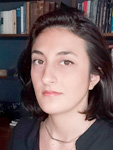 Farulli, Rebecca R.
Farulli, Rebecca R.
Rebecca Farulli is currently part of the Berlin Office of the German Marshall Fund of the United States. She completed a bachelor's degree in Philosophy at the University of Florence and the joint master’s degree in International Security Studies offered by the Sant’Anna School of Advanced Studies in Pisa and the University of Trento.
She perfectioned her studies with a master’s course from the Italian Association for the United Nations (UNA-SIOI) in Strategic Protection of the Country’s System focusing on Cyber-Intelligence, Big-Data and Security of Critical Infrastructures.
Her main research interests include evolving threats, strategic foresight and anticipatory governance, knowledge management for security policy.
Filipović, Ljubomir
Mr. Filipović is an analyst from Montenegro. He served his community as a Deputy and Acting Mayor of Budva and Political Advisor to Members of Parliament. He provides policy, capacity development, and management consulting support to governmental, nongovernmental, and private institutions in Europe; designs and implements economic trade and investment strategies for Eastern Europe and the Caucasus. He is published and is frequently called on by media platforms for commentary on global affairs. Ljubomir has long-term executive management experience gained in complex, integrated, and innovative development projects in collaboration with governmental, nongovernmental, and private institutions in developing and transitioning countries. He possesses the diverse background in government affairs, organizational management, communications, and media.
 Dr. Gaiser, Laris
Dr. Gaiser, Laris
ITSTIME, Graduated in Law at the University of Verona in 2002 with a final dissertation on “The consequences of the devolution of power in United Kingdom and the new role of the State in public economy”, earned his Master’s degree in International Affairs and Diplomacy from the Institute for International Political Studies (ISPI) of Milano and, after a specialization in crisis management and humanitarian action at UN Staff College, obtained a Ph.D. in Geopolitical Economy at University Guglielmo Marconi of Rome.From 2012 to 2014 he was Vice President, acting President, of Euro Mediterranean University – EMUNI and member Slovenian Minister of Foreign Affairs’ Strategic Council. Laris Gaiser is president of Slovenian Paneuropean Movement and Presidency member of International Paneuropean Union (Strasbourg). Involved in strategic consultancy, he also served as general manager in several international companies. As a member of ITSTIME – Italian Team for Security, Terroristic Issues and Managing Emergencies - at Catholic University of Milan (Italy), Senior Scholar at Center for the Study of Global Issues at University of Georgia (USA) and Visiting Lecturer at Diplomatic Academy of Vienna, he regularly teaches geopolicy, geoeconomy and intelligence issues.
 Prof. Dr. Gasztold, Aleksandra
Prof. Dr. Gasztold, Aleksandra
Prof. Dr. Aleksandra Gasztold is an Associate Professor at the University of Warsaw, Department of Internal Security in the Faculty of Political Science and International Studies. She recieved her Ph.D. in political science from Warsaw University, Faculty of Journalism and Political Science in 2009, morover, she did Ph.D. Habil in 2018. Her research focuses on female terrorism, intelligence and counterintelligence studies, as well as German foreign and security policy. A member of Women in International Studies (WIIS Poland) and Women’s Intelligence Network (WIN), social expert of the Government Centre for Security (RCB). She is the author of various works on counterterrorism and feminist perspectives in studies on terrorism. Last published: Feminist Perspectives on Terrorism: Critical Approaches to Security Studies, Spinger 2020; with P. Gasztold ‘The Polish Counterterrorism System and Hybrid Warfare Threats’, Terrorism and Political Violence online 25.June 2020; Gasztold, ‘US Influence on German-Polish Cooperation in the Field of Eastern Policy’, in: W. Hilz (et al.) Ambiguities of Europe’s Eastern Neighbourhood: Perspectives from Germany and Poland, Springer VS 2020.
 Dr. Gasztold, Przemyslaw
Dr. Gasztold, Przemyslaw
An Assistant Professor at War Studies University in Warsaw, Department of Security Threats, and a research fellow at the Historic Research Office of the Institute of National Remembrance in Warsaw.
He received his Ph.D. from Warsaw University, Faculty of Journalism and Political Science in 2016. He is currently conducting research on Polish intelligence services, on contemporary terrorism, on factions within the Polish United Workers’ Party, on relations between Poland, the Middle East, and African countries, and on the ties between the Soviet Bloc and international terrorism during the Cold War. He has published Koncesjonowany nacjonalizm. Zjednoczenie Patriotyczne “Grunwald” 1980-1990 [Licensed Nationalism. Grunwald Patriotic Union 1980-1990, IPN, Warsaw 2012, 446 pages], and Zabójcze układy. Służby PRL i międzynarodowy terroryzm, [Deadly Conspiracies. Polish Communist Intelligence Services and International Terrorism, PWN, Warsaw 2017, 422 pages]. He is the co-author (with M. Trentin, J. Adamec) of Syria During the Cold War: The East European Connection, Lynne Rienner Publishers, Boulder 2014. He has recently published Towarzysze z betonu. Dogmatyzm w PZPR 1980-1990 [Comrades of Concrete. Dogmatism within the PUWP 1980-1990, IPN, Warsaw 2019, 832 pages]. He is an alumnus of US State Department Study of US Institutions Program on National Security Policymaking at University of Delaware (2019).
 PhD Candidate, Kapsokoli, Eleni
PhD Candidate, Kapsokoli, Eleni
Eleni Kapsokoli is a Ph.D. Candidate at the University of Piraeus, Department of International and European Studies, Greece. She also holds a bachelor's degree from the National and Kapodistrian University of Athens at the faculty of Political Science and Public Administration. She earned her master’s degree in International Relations and Strategic Studies at the Panteion University of Social and Political Sciences. Her main research interests include international security, European security and defense policy, terrorism, cybersecurity and cyberterrorism. She is also a PhD Fellow at the European Doctoral School on the Common Security and Defence Policy, European Security and Defence College. Eleni Kapsokoli is a researcher in the Institute of International Relations (I.I.R), the Laboratory of Intelligence and Cyber-security of University of Piraeus and the Foreign Affairs Institute of Greece.
 PhD, Colonel (retired) Kari, Martti, University of Jyväskylä, Finland
PhD, Colonel (retired) Kari, Martti, University of Jyväskylä, Finland
Born in 1960, graduated at the Finnish Cadet Academy in 1984. Since 1988, he served in Finnish Defence Intelligence. In 2000-2001, he served as a Commanding officer of Finnish Crises Management Contingent, SFOR in Bosnia Herzegovina. In 2004-2007, he served as Finnish defence attaché in Poland, Ukraine and Lithuania placed in Warsaw. In 2012-1015 colonel Kari served as the director of Finnish signal intelligence and 2015-2017 as deputy director of Finnish defence intelligence. Colonel Kari retired from the Finnish Defence Forces in the end of 2017 and started to work as a teacher in Jyväskylä University. In Jyväskylä, he teach strategic intelligence, cyber security and topics related with hybrid threats. Doctor Kari has MA in Russian language (1993), MA in Cyber security (2017) and PhD in Cyber security (2019). In 2017 Kari was a Senior Fellow in Cyber Statecraft Initiative of Atlantic Council in Washington D.C. In 2020, he worked in Kyiv, Ukraine as a EUAM´s strategic adviser on Intelligence reform of Ukrainian intelligence/security services. Kari has published several articles on intelligence, cyber security, Russia and Ukraine.
PhD Candidate, Kosmopoulos, Athanasios
Athanasios Kosmopoulos attended the Corps Officers Academy (SSAS), from whom he graduated as military lawyer with the rank of second lieutenant, leader of the class of 1987. He specialized in International Law. He studied at the Academy of Computer Programmers of the Armed Forces. He taught as a lecturer at the Department of Information and Communication Systems of the University of the Aegean in Karlovasi, Samos. He holds an LL.M in European Law and Politics from the Uninettuno University in Rome. He is a PhD candidate at the International Relations Dept of the Panteion University on Hybrid threats. He is a Research Associate with the Center for Security Studies of the Hellenic Ministry for Citizen Protection. Since his resignation from the Armed Forces he was appointed as Legal Counsel with the Ministry of Development.
In May 2018 he was appointed as Data Protection Officer (DPO) of the Ministry of Digital Governance. Visiting lecturer at the Hellenic National Defense College, the Hellenic National Security Academy, National Intelligence Service and other institutions in Greece and abroad. His research interests concern hybrid threats, geopolitics and legal issues of data protection and disinformation.
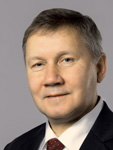 Dr. Labutis, Gintaras
Dr. Labutis, Gintaras
Military Academy of Lithuania, Vilnius, Lithuania
Born 1962, graduated from Vilnius University, the Faculty of Physics (1980) and continued his career as researcher. In 1992 completed his PhD in theoretical physics. In 1996 graduated from Philadelphia University (MBA). Later his career was related to top management positions in banking, leasing, insurance, and management consulting. In 2010 joined Energy Holding group in Lithuania as Chief Innovation Officer. Presently teaches at Military Academy of Lithuania (strategic management, project and change management, sustainable development and energy security) and acts as public technology transfer consultant at Lithuanian Innovation Centre. In 2017-2019 worked as Research Fellow at NATO Energy Security Centre of Excellence. As energy expert is delegated by Lithuanian MoD to participate in the projects coordinated by European Defence Agency.
 Brigadir General (Res.) Dr. Lapid, Ephraim
Brigadir General (Res.) Dr. Lapid, Ephraim
Brigadier General (Res.) Dr. Ephraim Lapid, Bar Ilan University, Israel. Extensive and diverse experience in the military and public affairs arenas. He holds a BA in Middle East Studies and Arabic from the Hebrew University in Jerusalem, a teacher's degree, an M.A. and a Ph.D. in political science. His research examines the development of the Israeli intelligence community during the years 1964 to 1979.
During his long military career, Lapid was a senior officer in the Israel Defense Forces (IDF) Intelligence Corps, served as an IDF Spokesperson, and was a senior instructor at the National Defense College. He was also the head of Israel Army Radio, Galei Zahal. Following his retirement from the army, Lapid has served in both the public and private sectors. A prolific author, Lapid has written numerous articles on Israeli intelligence, media and security. He edited a book in English on Israeli intelligence (Israel's Silent Defender). Active in public life, Lapid serves on the board of several public education and non-profit organizations.
 Dr. Liaropoulos, Andrew
Dr. Liaropoulos, Andrew
Assistant Professor in University of Piraeus, Department of International and European Studies, Greece. He also teaches in the Joint Military Intelligence College, the National Security College and the Air Staff Command College. He earned his master’s degree in Intelligence and Strategic Studies at Aberystwyth University and his Doctorate Diploma at Swansea University. His research interests include international security, intelligence reform, strategy, foreign policy analysis, European security policy, cyber security and Russian foreign policy. Dr. Liaropoulos is also a senior analyst in the Research Institute for European and American Studies (RIEAS) and a member of the editorial board of the Journal of Information Warfare (JIW) and of the Journal of European and American Intelligence Studies (JEAIS).
Dr. Livaja, Jerko
Ph.D. Jerko Livaja, employee of the Ministry of the Internal Affairs of the Herzegovina-Neretva Canton. Doctor of Law, Ph.D. acquired at the Faculty of Law, University of Mostar. He has been working in police agencies in Bosnia and Herzegovina since 1991.
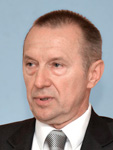 Maciejewski, Jan
Maciejewski, Jan
Sociologist, educator and academical teacher. Since 2009, he has been managing the Department of Sociology of Dispositional Groups at the Institute of Sociology of the Wroclaw University. Researcher and consultant in the field of sociology of dispositional groups, sociology of the armed forces, economic sociology, sociology of organization and management, sociology of education, andragogy and security. Promoter of over twenty doctoral dissertations, reviewer of doctoral dissertations, habilitation theses, research projects and books.
Member of numerous scientific societies and associations. He is active in the scientific committees of conferences and conventions - incl. he regularly conducts panels at congresses of the Polish Sociological Society, of which he has been a member since 1996. For over thirty years he has been conducting intensive didactic activities in Poland and abroad. Chief of many research projects: scientific, departmental (military) and development projects (including international projects).
The author of over one hundred and fifty scientific works, including over a dozen of monographs, several dozen collective books and articles published in Poland and abroad. The most important is the monograph "Dispositional groups. A sociological analysis” (2012, second edition of the book, extended published in 2014), in which he defines a new detailed discipline in sociology, internationally recognized. The organizer of cyclical (over thirty) scientific conferences in the field of social sciences covering the issues of dispositional groups in the field of security, which have been held continuously since 1996, integrating the international academic, military and business environments.
 Martinez Villanueva, Ivan L.
Martinez Villanueva, Ivan L.
Mr. Iván Luis Martínez (M) began his career as police officer in 2001 in different LEAs until he joined the Valencia Local Police in 2002. He has a wide-ranging professional background as he has worked in different tasks forces within the Valencia Local Police (road traffic, patrolling, community policing and domestic violence among others). He has expertise on gender-based violence, new technologies (cybersecurity, cyberbullying, AR & AI) and community policing. In 2016 he became the main researcher within the EU-funded projects INSPEC2T, ROCSAFE and HASP. Currently, he´s managing the participation of Valencia Local Police in three EU projects: DARLENE, S4ALLCITIES and EU-HYBNET.
He has studies in both humanistic and technical disciplines (Degree in Social Work and Agricultural Engineering).
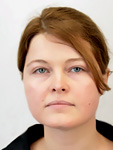 Dr. Ratsiborynska, Vira
Dr. Ratsiborynska, Vira
Adjunct Professor on NATO and transatlantic approaches to security and Global politics at the Vrije Universiteit Brussel (VUB). Her areas of research interests include the relations between the EU-NATO and the Eastern partners, Russia and Central Asia, e.g. in energy, trade, geopolitics, border security, conflict management and peacekeeping. Vira Ratsiborynska holds a Ph.D. from the University of Strasbourg, France. She wrote her dissertation on the European Neighbourhood Policy (with regard to the East) and publishes extensively in English and French on the topics of the European Union and the Eastern flank’s security, the relations with the Eastern Partnership countries, NATO and Russia. She obtained a Master’s degree in EU Studies from the College of Europe (Belgium) and a Master in Political and Social Studies from Sciences Po (France).
Her professional experience includes working in support of such organizations as the European institutions and NATO entities. She also has corporate experience in an American public affairs consultancy in Brussels as well as experience in communication and diplomatic fields. Dr. Ratsiborynska speaks English, French, Russian, Ukrainian, Polish, Dutch, and German.
 Prof. Dr. Shpiro, Shlomo
Prof. Dr. Shpiro, Shlomo
President of International Intelligence History association, Israel, Head of the Europa Institute at bar Ilan University and Senior Research Fellow at the BESA Center for Strategic Studies. Since 2008 he is also Chairman of the International Intelligence History Association (IIHA). He specializes in intelligence, terrorism and security studies. His research activities concentrate on the role of intelligence services as political mediators in the international arena, the intelligence activities of terror organisations, intelligence ethics and political influence, and on security crisis management and crisis communication.
 PhD Candidate, Snetselaar, David
PhD Candidate, Snetselaar, David
David Snetselaar is a PhD Candidate in Conflict Studies at Utrecht University (UU) and the Netherlands Defense Academy (NLDA). He has a BA in Cultural Anthropology (2017) and a MA in Conflict Studies and Human Rights (2018) and previously worked as an Assistant Research Fellow at the Centre for Global Challenges on issues related to Conflict and Security – one of the Centre’s four thematic areas. In April 2020, David began a new research project on early warning in collaboration with the Research Center for War Studies at the NLDA. The research looks at the hybrid threat perceptions that have emerged in the West and the responses these threats have triggered. Beginning in the Netherlands, the objective is to understand how early warning entails an act of governing security outcomes in an increasingly interconnected and digitized world. The 'common denominator' in David’s research is an interest in the changing nature of war and conflict in the twenty-first century and the implication this has for military strategy, policy making, human rights reporting and academic research on conflict-related issues. David is also an Affiliate Researcher at the Intimacies of Remote Warfare Program at the UU.
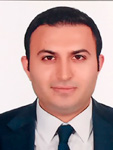 PhD Candidate, Solmaz, Tarik
PhD Candidate, Solmaz, Tarik
Born in 1989, graduated at the Faculty of Political Science in İstanbul in 2012. He received his master’s degree from TOBB University of Economics and Technology, Department of Political Science and International Relations in Ankara. From 2014 to 2018, he served as an assistant expert in the Undersecretariat of Public Order and Security (Turkey), whose main task is to develop counter-terrorism strategies. Currently, He is a PhD Candidate at the University of Exeter, Strategy and Security Institute. His thesis examines the changing character of warfare and, in particular, ‘hybrid warfare’.
 Tustanowska, Beata
Tustanowska, Beata
PhD Candidate in sociological studies at the University of Wrocław, Institute of Sociology, Department of Sociology of Dispositional Groups. Master of Economics, a graduate of the University of Economics (formerly the University of Economics) in Poznań, specialization: finance and banking. Born on July 23, 1978 in Wolsztyn. A graduate of numerous postgraduate studies in management and business, incl. Organization and Management (UE Poznań), Executive MBA (WSB Poznań with Aalto University in Helsinki).
She has over 20 years of professional experience in managerial positions in business and in management boards of capital companies. Professionally associated with international business in the B2B segment, especially in technology companies (electricity, space technologies, military technologies).
Subject of sociological research: Smart City, city sociology, sociology of dispositional groups, sociology of social changes.
 Dr. De Valk, Giliam
Dr. De Valk, Giliam
Initiated, coordinated, and lectured at different academies a minor intelligence studies. Dr. G.G. (Giliam) de Valk (1961) studied at the Law Faculty of Leiden University. He wrote his dissertation (2005) at the Law Faculty of University of Groningen on the quality of intelligence analyses: Valk, Giliam de, Dutch Intelligence: Towards a Qualitative Framework for Analysis. Den Haag: Boom juridisch, 2005. Since 2016 he is assistant professor at the Institute of Security and Global Affairs (ISGA) of the Leiden University. He lectures and researches on intelligence, analysis and methodology. After his dissertation he started to work as a lecturer at the Department for Political Science (2006-2008) and at the Institute for Interdisciplinary Studies (2007- 2016) of the University of Amsterdam. At this Institute, he was the initiator and coordinator of the Minor Intelligence Studies (2007-2016). In 2012, he transformed this Bachelor Minor Intelligence Studies into a center: the Ad de Jonge Center for Intelligence and Security Studies. In 2016, he and his team transferred to the ISGA (see above).From 2006-2011, he was a lecturer for the History of International Relations Section at the University of Utrecht. He taught on issues as intelligence studies, strategy (Von Clausewitz), humanitarian intervention, counterinsurgency, terrorism and counter-terrorism.
- 2006 onwards, he participates as a guest lecturer in the analyst education of the Defense Intelligence and Security Institute (DISI).
- 2010-2012, he was employed at the Netherlands Defense Academy in Breda, at Faculty of Military Sciences, where he had put up and coordinated a Bachelor Minor Intelligence Studies.
- 2004-2012, he was the secretary of the Netherlands Intelligence Security Association, of which he is still a board member.
- 2006-2012, he was a member of the Archive Committee of Ministry of Foreign Affairs.
- Since 2009, he participates in the Dutch Counterinsurgency Network.
- Since 2012, he is a member of the Dutch Think Tank Integral Security.
- De Valk participates for many years in Red Team exercises concerning vital infrastructure and corporate business.
 PhD Candidate, Wyss, Michael
PhD Candidate, Wyss, Michael
Michel Wyss is a lecturer at the Department of Humanities, Social and Political Sciences at ETH Zurich, a scientific assistant at the Chair of Strategic Studies at the Military Academy at ETH Zurich, and a PhD candidate at the Institute for History, Leiden University. He has published his research on proxy warfare in International Security, International Studies Review (forthcoming), Lawfare, and in several edited volumes, and he is the co-editor of the forthcoming Routledge Handbook of Proxy Wars. His work has also appeared in media outlets such as The National Interest, The Times of Israel, and the Allgemeine Schweizerische Militärzeitschrift (ASMZ). He holds a MA in Government (magna cum laude) from the Lauder School of Government, Diplomacy and Strategy at the Interdisciplinary Center Herzliya.
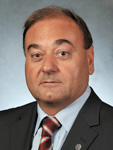 Captain (BGR-N) (ret.) Yanakiev, Yantsislav
Captain (BGR-N) (ret.) Yanakiev, Yantsislav
Full professor in sociology at the Bulgarian Defence Institute “Prof. Tsvetan Lazarov”.
He graduated from the Naval Academy in Varna, Bulgaria in 1982. After serving as a commissioned officer at Naval Base Varna, the Navy Headquarters and the Ministry of Defense, he applied for a doctoral study degree in 1988 at the Institute of Sociology, Bulgarian Academy of Sciences in Sofia, Bulgaria and received his Ph.D. in 1995. In addition, he acquired the degree of Doctor of Science in sociology from the same institute in 2009.
Professor Yanakiev specialized as an International Research Fellow at the NATO Defense College in Rome, Italy in 1999, at Cologne University, Germany in 2001 and 2007 and G.S. Marshall Centre for International Security Studies in 2012. He was a Fulbright Visiting Research Professor at the Defense Equal Opportunity Management Institute (DEOMI), Patrick Air Force Base, FL from October 2012 to March 2013.
Prof. Yanakiev has been the principal national representative to the NATO Science and Technology Organization, Human Factors and Medicine Panel since 2005. He received an Individual Scientific Achievement Award of NATO Science and Technology Organization for 2018.
 Dr. Zekulić, Vlasta
Dr. Zekulić, Vlasta
Core Policy Development, Operations Division, NATO HQ
Dr Zekulic was commissioned as an Infantry officer to the Croatian Armed Forces in 2002, after graduating with a Bachelor of Science degree in Computer Science and Management of Information Systems from The Citadel, Military College of South Carolina. Given her additional bachelor degree in Criminalistics from Police College in Zagreb, she held numerous command and staff positions within the Croatian Military Police community, and deployed several times to NATO’s operational theatres. After completing the Croatian Command and Staff College in 2008, graduating first in her class, she was appointed an executive officer to the Croatian Deputy Chief of Staff. From 2010 until 2014, she commanded a battalion at the Croatian Defence Academy.
From late 2014 she served at the Allied Command Transformation, Strategic Plans and Policy Division, where she led the interoperation of high level political guidance and developed policy papers, strategies and inputs to NATO Military Authorities on issues including, but not limited to, challenges of a changing security environment, hybrid warfare, resilience and Readiness Action Plan. This work led to a posting as a deputy head of the Strategic Assessment Element in the Emergency Security Challenges division at NATO HQ, where she worked on initiating, developing and drafting strategic assessments aimed at identifying emerging crisis, enhancing situational awareness and providing early warning for use by the Secretary General and the Chairman of Military Committee. Of special consideration are her assessments of the conventional and hybrid security challenges in Western Balkans and Africa.
In September 2017, LTC Zekulic transitioned to the NATO International Staff, Operations Division, developing assessments, policies and strategies relating to NATO’s operational preparedness and planning, particularly in relation to posture management and deterrence messaging, countering hybrid threats, and crisis management. Parallel to her military career, she also continued with her academic education, gaining a Master of Science degree (2007) and PhD (2012) in international relations and national security. Having published more than thirty expert and scientific articles, she is also a Scientific Associate at the Faculty of Political Sciences, University of Zagreb, and a regular lecturer at the NATO School Oberammergau. She is a member of numerous associations, including the Atlantic Council of Croatia, the Board of Directors for the Centre for International Relations, the Scientific Council of International Military Academic Forum, and World’s Council Affairs.
Dr Zekulic is the recipient of numerous personal awards and decorations from Croatian Chief of Staff, Minister of Defence and the President of Croatia, including the Order of the Croatian Interlace.